home | metro silicon valley index | movies | current reviews | cinequest
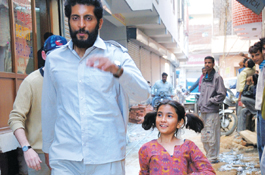
Amal
(Canada/India) Being a nice guy rarely pays, and neither does a film about a nice guy. In this drama by screenwriter/director Richie Mehta (co-written by Shaun Mehta), electric rickshaw driver Amal (Rupinder Nagra) cuts everyone slack but himself and still has nothing to show for it in the end. The plot moves slowly, alternating between scenes focusing on Amal and an older man (in Hindi) and on a lawyer and potential beneficiaries of an estate (in English). Though not a thrill ride (rickshaws only move so fast, mind you), some of the film's highlights come by way of straight-forward acting in scenes depicting genuine human connections, and the reality of life is that it isn't always particularly exciting. (CT)
March 8 at 7:30pm and Mar 9 at 1:30pm, both at the California Theatre.
Autism: The Musical
(U.S.) The title and the film are no joke. Tricia Regan directs a clear-eyed documentary about a cloudy disorder. She follows Miracle Project founder Elaine Hall through six months of preparation for a musical starring autistic children in West L.A., while VCR footage shows the kids and their parents earlier in their lives. The film displays the tenacity and persistence of the mothers (not always flattering), the unique personalities and raging quirks of the kids, and small transcendent moments like a teenager singing Joni Mitchell's "Urge for Going." (DH)
March 2 at 1:30pm and March 8 at 5:15pm at San Jose Rep, and March 7 at 6:30pm at Camera 12.
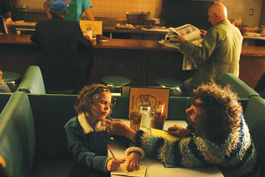
Anywhere USA
(U.S.) Swinging between artistic intentions and hicksville satire, Anywhere USA comes off like a cross between South Park and a less disturbing Gummo. In three vignettes, the film follows three groups of North Carolina residents. "Penance" tells the story of a slacker whose girlfriend throws him out. When she develops a penchant for pistachios and Internet dating, the slacker concludes that a terrorist plot is afoot and sets out with his coked-up dwarf buddy to remedy the situation. "Loss" concerns a confused girl in the custody of her well-meaning but inept hippie uncle. In "Ignorance," an affluent businessman has a profound epiphany that launches him into a singular mission to talk to black people. Each section vaguely links to the one before it, but the film makes a point not to fit a traditional liner plotline. However, at more than two hours, the film's irreverent tone moves from mildly intriguing to tedious. (JF)
March 2 at 6:15pm, March 4 at 6:30pm and March 5 at 2pm, all at Camera 12.
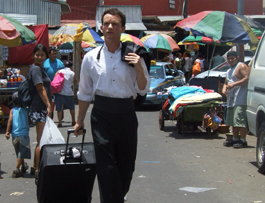
The Art of Travel
(U.S.) What Into the Wild tried to be for North America, The Art of Travel tries to be for Central and South America. Derived from a webcast, this fictionalized travel adventure follows Conner (Christopher Masterson from Malcolm in the Middle) on an impromptu trip to Nicaragua. Recruited for an expedition to cross the Panama/Colombia Darien Gap via jeep, Conner also finds a love interest. As the scenery gets better, the writing gets worse; the bit about Conner's Bolivian mother (Maria Conchita Alonso) seems to be only there to patch the flagrant gringocity. What's missing is a sense of how new lands change a voyager. From the evidence of a late scene in a South American plaza, Conner is still the same self-centered guy he was at the beginning. The dick-wielding summer-camp–style practical jokes on the road are as extraneous as the film's first 15 or so minutes: the dramatizing of a whiskery old urban legend that wasn't funny 10 years ago and sure isn't funny now. (RvB)
Feb. 29 at 9:30pm at the California Theatre; March 1 at 2:15pm at Camera 12; March 6 at 4:30pm at San Jose Rep.

A Better Life
(U.S./Mexico) Director Andrew James' multistrand tale of immigrant life in the Southwest begins with an illegal border crossing, a harbinger of troubles to come. Javier labors in the fields (where work permits are easy to come by) and sends money home to Mexico. Omar has trouble finding work, angering his wife, Sofia, who is at home with two children. Another couple visits a social worker, Sam, who reluctantly informs them they don't qualify for assistance. The characters' destinies crisscross when Omar joins a relative in an armed robbery at Sam's home. The black-and-white film starts slowly with well observed, dialogue-free, almost poetic scenes of immigrants—legal and illegal—simply working and living. Lupe Barrera gives a fine performance, tending for her children and jostling Omar into finding a piece of the American dream. Then the movie goes all Straw Dogs, with not one but two acts of extreme violence, as if the director figured people wouldn't sit still for even 74 minutes of realism without the promise of a grand guignol finish. (MSG)March 2 at 4pm and March 6 at noon, both at Camera 12; and March 3 at 5pm at San Jose Rep.
'Bitter Sweetheart'
(Sweden) Director Hella Joof follows the coming of age of 15-year-old Lina (Mylaine Hedreul) and her quest to become a woman. Her so-called friends have led her to believe that losing her virginity is the only thing that matters at their tender age. Though she pines for a schoolmate, she forces herself to date Danne, a high school boy who thinks she is "OK-looking." Despite the horrible title, this is a classic teen drama told through awkward moments and diary entries, remaining honest about the female teenage psyche in adolescence. The message is ultimately effective: Being a follower never led anyone anywhere they wanted to be. (CT)
Feb. 28 at 7pm and March 3 at 9:30pm, both at Camera 12.

Breaking the Surface
(Germany) A grad student in photography, Nadja (Henriette Heinze), lands a job at a popular magazine and then meets a new boyfriend (Golo Euler) at a dance club. They begin a heavy, intense relationship with plenty of hot sex, at least until the other shoe drops, and Nadja's life begins to fall apart. German director Felicitas Korn stays intently focused in the given moment, pulling no punches when dealing with the characters' full emotional weight. Heinze's powerful presence helps; the actress is blessed with a kind of direct, prying gaze that rips open any and all facades. But this technique does not disguise the disjointed style of the overall narrative; we are expected to make huge jumps in time and logic, and the cohesive whole suffers. (JMA)
March 6 at 9pm, March 8 at 11:30am and March 9 at 5:45pm, all at Camera 12.
*Butterflies
(Sweden) With this 52-minute family film, Swedish director Kjell-Ĺke Andersson strikes a satisfying mix of crummy reality, comic villainy and flights of fancy. A stressed mom (Frida Hallgren) runs in the rat-race fast lane and has begun to lose touch with her daughter, Sara (Alice Havrell). Sara, on the other hand, has begun to levitate and fly when she listens to the butterflies in her stomach. Mom takes her to the hospital, where greedy doctors try to wrench the secret from her. But a spirit like Sara's can't be quenched that easily. The film's brisk, low-key direction and enjoyably low-tech visual effects give it a certain kind of humility; it transcends the cutesy, cloying eagerness of many kids' films. Screens with the short film Departure. (JMA)
March 5 at 6:45pm and March 8 at 4:30pm, both at Camera 12.
Commit
(U.S.) A play that thinks it's a film. Director/writer Mickey Blaine stages his story in three acts: three half-hour-long takes about the beginning and end of a relationship. Two unhappy New York City singletons (Nicole Blaine, Forest Erickson) meet right off on the Internet. After the preliminaries (establishment of their sexual preferences, narration of their college lives and work histories), we learn why they're getting together. They're trying to make a suicide pact. An idea that someone like Patrice Leconte might have made work is visually claustrophobic. Sub–Kevin Smith quips make the time pass more slowly. (RvB)
Feb. 28 at 9:30pm, Feb. 29 at 4:30pm, March 2 at 9:15pm, all at Camera 12.
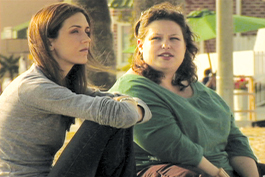
Disfigured
(U.S.) A movie about women and weight that was obviously not written by a woman. Writer/director Glenn Gers (who wrote Mad Money, another misguided attempt at feminism) tries to encompass the confusion and frustration of being female and eating-disordered in image-conscious L.A. However, even with the sincerest of intentions, Disfigured descends into melodrama. Lydia (Deidra Edwards) is a thirtysomething member of a fat-acceptance group. When Darcy (Staci Lawrence), a recovering anorexic, shows up at a meeting because she "sees herself as fat," she is told to leave. Even so, Darcy and Lydia begin a friendship. When Lydia's romance with a man in her fat-acceptance walking group goes sour, she desperately turns to Darcy for "anorexia lessons." Tempers fly as both women start to confront their entrenched body-image issues. Gers stuffs the film with numerous contemplative shots of Lydia and Darcy walking around Venice Beach and watching the sunset as the talk about their feelings. The film's deepest problem is the improbable dialogue, which is clogged by stereotypes and phony frankness. Though Gers makes a point to break down obesity stereotypes, he disregards the fact that Lawrence's cucumber-munching anorexic is the film's grossest characterization. For a movie that seeks to empower women, Disfigured ends up a pointlessly supersized emotional binge that neither asks any new questions nor gives any original answers. (JF)
Feb. 28 at 6:30pm, Feb. 29 at 9:30pm and March 2 at 1:30pm, all at Camera 12.

Dot.Com
(Portugal) Dot.com is a David and Goliath tale about an isolated little mountain town, Aguas Altas, pitted against a multinational beverage corporation with a trademarked product of the same name. In his quest to connect the town to the outside world with a new road, a young civil engineer builds a website (called Agues-Altas.com) for the otherwise tech-illiterate town, and they all get hit with a nasty lawsuit. The battle that ensues is as confused as it is confusing, full of silly behavior and implausible plot twists, but also blessed with genuinely funny characters, conflicts and misunderstandings. Dot.com is also one of those self-reflective films that aspire to embody their own central theme of folksy charm triumphing over artful sophistication—Dot.com is silly and sweet, not an art-house flick at all—and to the extent that you prefer folksy charm over artful sophistication, it succeeds, along with its winning cast and idyllic pastoral setting. (MC)
March 3 at 6:30pm, March 6 at 4pm and March 7 at 7pm, all at Camera 12.
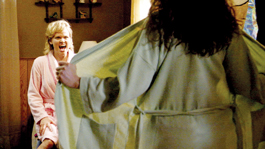
Eden Court
(U.S.) This corner demands more movies set in trailer parks. But John Waters might have the best way to approach them: as outposts of individuality, surrounded by vast gulfs of prejudice and conformity. Director Paul Leuer, adapting his play, keeps diminishing his characters into a series of lovable quirks—except in the case of one character, Barb (Mad TV vet Stephnie Weir, too tough and too raunchy for prime time).
On his 30th birthday, Schroeder (Thomas Lennon of Reno 911) works as a mere grass-cutter at the real-life Alexian Field, Ill., home of the minor-league Schaumburg Flyers (they play the Fargo-Moorhead Redhawks, Joliet Jackhammers and other prairie sluggers). A busted shoulder had ended his dreams of playing pro-ball.
Secretly, Schroeder bought Australian real estate based on an informercial pitch. "I made a promise to myself that I was gonna live the American dream, even if I have to go to Australia to do it," he says. He plans to sneak off from his single-wide and abandon his other half, Bonnie (Kimberly Williams-Paisley), who has been making regular noises about wanting to have a baby.
What follows is an I Love Lucy–ish bad day of missed connections, misunderstandings, forgotten cakes and minor traffic mishaps. All are resolved with a sitcom axiom about The Most Important Thing in the World.
I won't be the first to note how much Lennon resembles Craig Kilborn in look and action. What happens to Barb is much more interesting. On her agenda: starting the day with stolen champagne; having a daylight screw with her gooberish ex-boyfriend; getting canned from her job; intervening when the brain-damaged girl next door runs over her foot with a power mower; and relaxing for a few well-deserved highballs at her favorite bar, still wearing her bloody bathrobe from the previous emergency. This blithe, if drunk, spirit embodies the myth of our trailer parks. (RvB)
(Opening night, Feb. 27 at 7pm at the California Theatre, with an afterparty with the filmmakers at the Paragon Restaurant, 211 S. First St., San Jose.)

El Camino
(U.S.) Three mismatched souls hit the road. Financing the trip is Elliot (Leo Fitzpatrick), a shy foster-home product in a black funeral suit. With him come the two he has bribed into driving. Their mission: to scatter the ashes of a dead mutual friend on a Mexican beach. The scruffy 28-year-old Gray (Christopher Denham) has father issues and is about to become a father himself. His girlfriend du jour is a stripper named Lily (Elizabeth Moss of TV's Mad Men, a very good actress in the wrong role). Since Elliot looks at everything through the viewfinder of a video camera and asks probing questions like "Where do you see yourself in 10 years?" we can figure he is the director's surrogate. The ensemble meet a salt-of-the-earth hog farmer (the reliable Wes Studi, using a cowpoke accent) to bring themselves up to speed on current events, such as the unsettling of America and the war on Iraq. The group doesn't get to Mexico until 70 minutes into the film. El Camino is chronically overstated, and here are some actual lines to prove it—Lily, "I'm the crazy bitch ex-girlfriend ... it's not like I killed him." Gray: "I'm the rich asshole kid who's had everything handed to him." (RvB)
Feb. 29 at 9:30pm and March 2 at 9pm, both at San Jose Rep; and March 4 at 4:30pm at Camera 12.
*The Émigré
(Hungary) Sándor Márai is a Hungarian author who is just now being discovered in the West. This Hungarian film—in the ballpark of The Diving Bell and the Butterfly—is adapted from the last installment of his diary. Márai had the misfortune to live "at the intersection of two mad ideologies." His country was plundered first by the Nazis and then by the Soviets. In exile in San Diego, the author (played by the Bruno Ganz–like Ferenc Bács) witnesses the slow death of his wife. Meanwhile, he fends off his new fame and invitations to return to Hungary. Márai feared that such a visit would be endorsing the Communist government. (He's so immersed in his memories that he can't predict the fall of the Berlin Wall even by winter 1989. It is an irony that this film is too wise to point out.) As his life wanes, he's closer to the recollections of the honeymoon trip to Naples and Herculaneum. The world around him is of much less note. America "didn't give me a home, but it took me in," and the new country made half-strangers out of Márai's descendents. Confirmed New Worlders who can't handle last thoughts may be warned against this film. I'm on the trail of Márai's hard-to-find novels after hearing his comment here: "Dying starts when you don't feel dying is impossible anymore." There were plenty of '56ers from Hungary in L.A. when I was a kid, and I used to wonder how they could reconcile their silences, their correctness and their gilded, heirloom-crystal chandeliers with the brutal sunshine and barbaric yawp of California. This movie gave me a better idea of what it was like for them. (RvB)
Feb. 28 at 4pm, March 5 at 7pm and March 6 at 2pm, all at Camera 12.
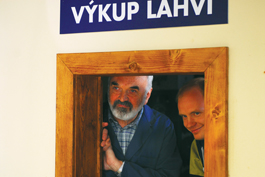
Empties
(Czech) Zdenék Sverak essentially reprises his role from the Oscar-winning Kolya, again portraying a lusty gray man put out to pasture. Here he plays a literature teacher who abruptly retires after improperly disciplining a student. Too restless to sit around the house with his wife, he takes a job at a local Prague supermarket recycling the eponymous empty bottles and helping fill the lives of the customers—whether invited or not. His gregarious nature teaches either "Drink the flask of life to the dregs" or "There's no fool like an old fool," depending upon one's attraction to risk. Although the sexual politics may seem too old-school Eastern European for the Bay Area, the fine cast and beautiful scenery present a compelling case for emotional mercy, if not justice. (DH)
March 7 at 11am, March 8 at 9:30pm and March 9 at 5pm, all at Camera 12.
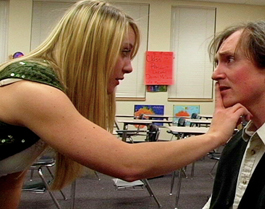
The End
(Canada) Director/writer Jeremy Thomas displays all the ticks of someone who has seen too many Charlie Kaufman movies. Delighting in his discovery of the kind of jokey recursiveness that films-within-films inspire in clever makers of films about films within films, Thomas' starts The End like a comic faux-horror-movie mystery. The movie ends by rolling up on itself in a series of metajokes that just won't, well, end. Joseph (played by Thomas) is a schoolteacher beset by visions that may reveal the identity of a serial killer; reluctantly, his friend Clara (Ella May), a policewoman, enlists Joseph in the hunt for the fiend. The twists start coming when Joseph claims that he is really just a character in a movie, while those around him think that he just needs more meds. Eventually, the script itself makes an appearance, and everyone tries to outrun a destiny that only the filmmaker controls. Best line: "We've got a psycho on the loose lobotomizing garden gnomes!" (MSG)
March 7 at 9:15pm and March 8 at 4:30pm, both at Camera 12; and March 9 at noon at San Jose Rep.
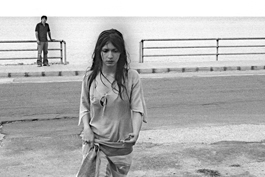
The Eternal City
(Italy/U.S.) Two American guys and an Italian girl in Rome bond in a Jules and Jim–style romp. The beautiful black-and-white cinematography and can't-miss locations justify the film visually, but how much you enjoy The Eternal City on an emotional level depends on how appealing you find rambunctious Philly guy Jonny (Joe Iacovino), who crashes on the couch of a young American/Italian filmmaker named Jesse and his girlfriend, Angela (Guilia Steigerwalt). Jonny quickly agrees to play Napoleon in Jesse's scheme to make a grandiose film called The Retaking of Corsica. The epic doesn't look any more promising than Jesse's documentary about the "birds" of Rome—i.e., building cranes—a musical tour of the city's skyline with lyrics about "cement mixers and corrugated steel and other things." Of course, the real dynamic is romantic, as tetchy Jesse ignores sensitive Angela, who finds herself drawn to comically energetic Jonny. Nothing much happens, and the film is hampered by Julia's dream sequences (which mock European art-film pretensions) and a subplot with Jesse's piano-tuner father, but Steigerwalt makes a sweet apex of the love triangle, and the picture doesn't push too hard for a false resolution. (MSG)
March 1 at 9:30pm, March 2 at 11:15am and March 3 at 2pm, all at Camera 12.
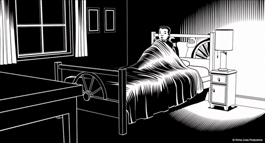
*Fear(s) of the Dark
(France) An ambitious, uneven anthology by six artists, proving that France (home of Persepolis) is a haven for black-and-white 2-D animation. From low to high: designer/New Yorker cover artist Pierre di Sciullo's moving geometrical shapes are accompanied by chattering-class fears (minor social anxieties, mostly); Di Sciullo's snippets intrude relentlessly into the more visceral—if at times slightly pointless—material. An example of "pointless" is Christian "Blutch" Hincker's character, who looks and is dressed like the Marquis de Sade, prancing around siccing his mastiffs on the working class, until he gets the kind of payback any good Marxist could have predicted. Far better is Marie Caillou's tribute to Japanese animation, with a doll-like little girl in a sailor suit trying to combat a case of demonic possession. (Caillou's style is pretty much like the "Fruity Oaty Bars" commercial, as seen in Serenity.) Approaching the top is Charles Burns' tale of insect fear, as good as anything in his recent graphic novel Black Hole, although the limited animation tends to thwart the punch of the images. Richard McGuire's wordless episode about a snow-bound haunted house is perfection. Here is a vibrant, brutal contrast of black and white, of positive and negative spaces—and deceptively simple graphic storytelling. It is the most genuinely fearful of these fearful stories. (RvB)
March 5 at 7pm at the California Theatre and March 8 at 9:15pm at Camera 12.
Getting Home
(China) Equal parts road movie, buddy flick and Weekend at Bernie's, the Chinese feature Getting Home ranges from slapstick laughs to what ends up as a poignant reflection on friendship and the meaning of home. Then again, the movie could be a not-so-subtle message about the perils of leaving rural China in search of work. Set against modernizing China and the construction of the Three Gorges Dam, the film follows a poor construction worker named Zhao, played by the versatile Zhao Benshan, and his efforts to take his working buddy Liu (Hong Qiwen) back home. The tricky part is that Liu is dead. Zhao carries, rolls and pulls his friend on a journey across southern China toward Liu's hometown. Along the way, the hapless but steadfastly loyal Zhao is robbed, tricked, arrested and sometimes befriended as he tries to do right by his friend and get him home. (SH)
March 5 at 7:15pm and March 7 at 7pm, both at Camera 12.
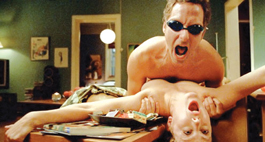
Gone With the Woman
(Norway) This Norwegian comedy about the battle between the sexes is intermittently funny, buoyed by the gee-whiz performances of leads Trond Fausa Aurvag and Marian Saastad Ottesen as an unlikely couple who are oblivious to their own foolishness. When the raunchier but similarly themed Knocked Up (Gone With the Woman complicates its relationship with a premature train trip through Europe together rather than a pregnancy), many accused it of being stereotypical and sexist. The same could be said—with more justification—of this film. Here, women are pushy, fickle and talk too much; men are sex-obsessed and insecure. The message is most likely that some people just aren't meant to be together, but would anyone really want to be with these two? (SP)
March 1 at 9:30pm and March 4 at 4:30pm, both at Camera 12; and March 2 at 9pm at the California Theatre.
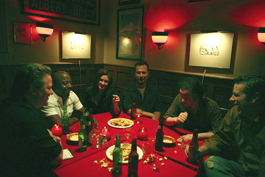
Goodbye Baby
(U.S.) A modern coming-of-age tale about Melissa (Christine Evangelista), a Daily Show and David Cross–loving 18-year-old girl who dreams of becoming a standup comic. It's a brutal profession, and particularly useful for a director who is trying to show that his central character is both precocious and gutsy. While her timing could be better, Evangelista actually makes a decent (and adorable in a Katie Holmes sort of way) comic. The film provides a surprisingly realistic portrayal of upper-middle-class young adults in New York, but it suffers from the same low expectations of its disaffected comedians (one of whom is played by an uncredited Fred Armisen), and never really tries to knock a ball out of the park. (MC)
March 6 at 4:45pm, March 7 at 6:45pm and March 9 at 1pm, all at Camera 12.

Half Empty
(U.S./Germany) Unable to sell any books in the United States, "happiness counselor" Bob Patterson (Oklahoma-born character actor Robert Peters) goes to Germany on a promotional tour. His publicity person and guide, Greta (the hugely appealing Mareike Fell), informs him that she thinks he's a joke, and she may be right. The dreamy, dislocated Bob is so wrapped up in making notes on 3-by-5 cards that he rarely connects with anyone. Peters, who also wrote and directed, gives the film an inappropriate faux-documentary look without following any of that genre's rules, and it is a huge stretch when Bob and Greta, with their chronic lack of chemistry, become romantic partners. But the movie's catchy Once-like songs (yes, it's a musical) have their own wonderful energy that helps keep things going. (JMA)
Feb. 28 at 7pm, March 1 at 2:15pm and March 6 at 9:30pm, all at the California Theatre.

Hope
(Poland) In Stanislaw Mucha's crime drama, you often find yourself wondering if main character Francis is in over his head. A quiet young man with a thick halo of blond curls, Francis inexplicably decides to take on Benedict, a big-time art thief. After videotaping him stealing an Italian Renaissance painting that hangs in the church where his father works, Francis introduces himself to Benedict and demands that the painting be returned. If Benedict doesn't comply, Francis will send his evidence to the police. The real beauty of the film is its strong use of orchestral sounds. Francis' father was a great composer, and for dramatic effect, his works are interspersed throughout the film. Even the stolen painting, which depicts an angel with a violin, illustrates this consistent musical vein. However, the real mystery seems to lie in figuring out what Francis' real motivation. Rafal Fudalej's Francis is unusually cunning. But why? Even with his conscious intentions, Francis often has the cold, dead stare of one not feeling anything. Subplots attempt to flesh out the film's side characters, but in the end they are dissatisfying and never truly connect the reasons for his behavior. (JF)
March 6 at 9:30pm, March 7 at 2pm and March 9 at 5:15pm, all at Camera 12.
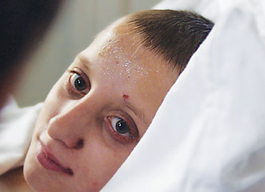
Iska's Journey
(Hungary) Young Iska (Máría Varga), a short-haired, rag-dressed girl of about 12, endures a life of penury with her mother and stepdad near the world's worst coal mine. The film opens with shots of Iska scrabbling through the reeking muck and mire for scrap metal to sell. After her mother beats her, she spends time in a state-run orphanage, where she meets a friendly boy her own age. With her new pal, Iska enjoys some larkish adventures that capture the genuine feel of children freed from the weight of adult presence, like the best moments in The 400 Blows. But harsh reality keeps intruding. A mine supervisor catches Iska sleeping inside and shoos her away. "The slag heap is still warm," he advises, and sure enough, Iska spends the night on a bed of raw coal chunks. Later, Iska's sister succumbs to some unspecified health problems, and another miner recalls how Iska's real dad died in a mine explosion. Then things take a turn for the even worse, as Iska is kidnapped by sex slavers. Varga gives a heartbreaking performance as the pug-nosed urchin with a capacity for forbearance that society keeps stomping on, but Iska's Journey crams so much suffering into 90 minutes that the film becomes almost unbearable. (MSG)
March 4 at 9:15pm, March 6 at 4:30pm and March 9 at 10:15am, all at Camera 12.
Reviewers: Jeffrey M. Anderson (JMA), Mike Connor (MC), Jessica Fromm (JF), Michael S. Gant (MSG), Don Hines (DH), Stett Holbrook (SH), Steve Palopoli (SP), Claire Taylor (CT) and Richard von Busack (RvB)
Send a letter to the editor about this story.
|
|
|
|
|
|